RV Trip
Life on the Open Road
...author and speaker, Carol White answers your questions about life on the road
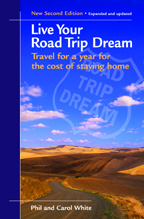
Carol White is the co-author of the award-winning book on RV Trips, “Live Your Road Trip Dream” (www.roadtripdream.com) – the ultimate RV trip planning guide for extended road trips. Carol and her husband Phil have traveled over 50,000 road miles in the past several years, visiting all fifty states and having visited all of the National Parks in the “lower forty-eight.”
As national spokespeople for the RV Industry, they now spend their days speaking, writing, and helping others to live their dreams. Carol also writes for a variety of travel-related websites and magazines as well as managing an active publishing consulting practice from their home in Wilsonville, Oregon.
If you're thinking of an RV trip, there is no better way to start than Carol and Phil White's book "Live Your Road Trip Dream."
Carol and her husband "took off" for a year on an RV trip, kept a journal and turned it into an award-winning book about living life on the open road in an RV.
How did she and her husband do it? Read her book and you will learn it didn't happen overnight. A lot of planning and research went into it and her book explains it all.
BestGuide: Thank you, Carol for taking time to visit with us today and especially help persons over 50 and retirees know more about RV trip lifestyles. I asked, "What is the ideal age to take a year-long road trip dream."
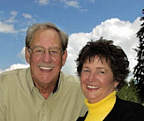
Carol White: I think you should take a lifetime of road trips! There is no ideal age. If you haven’t had the rv trip bug bite you yet, then NOW is the time to start planning your first trip.
Phil and I believe that you should take at least one really long trip
in your lifetime. The things that you learn about yourself, your
traveling companion and your country just can’t be learned any other
way. The memories created will be among the most treasured of your
entire life.
Open Road: Car or RV
BG:I have traveled across the country at least 3 times in a car, "What makes traveling in an RV different," I asked Carol.
Carol: We traveled 37,000 miles in one year on our long road trip (and have taken many road trips before and after). We traveled to all 48 of the contiguous states, saw all 43 of our national parks, and had the time of our lives. You, of course, can take a trip like that in your family car, but when you are gone for more than a month or so, you may want to consider having more of your own possessions around you.
Phil and I had never even been in an RV before we went on our RV trip, so it was a totally new experience for us, but we really enjoyed having our own bed when we wanted it, a kitchen to fix breakfast and lunches in (and sometimes dinner too), a place for all our clothes and sports equipment, and most of all – a dependable bathroom anywhere we wanted it!
BG: Your book covers everything from A to Z. It is more than a guide but also an entertaining look at life on the open road. Everything is mentioned in detail from what kind of RV to buy....
Here is a list from your website, www.roadtripdream.com of Types of RVs (I had no idea how many there were until I read Carol's book):
- Towables - Designed to be towed by a suitable car, van or pickup truck. Can be unhitched and left at the campsite while you explore in your auto. Choices include pop-up or folding trailers, truck campers, travel trailers, fifth-wheel trailers and "toy-hauler" trailers.
- Motorized RVs - These are all inclusive in one unit - the living quarters are accessible from the driving area. People often tow a car behind the unit for exploring the area when parked. Three classes of these units are available:
- Class C units feature a "cab-over" design on a van or truck-type chassis.
|
RV Class C 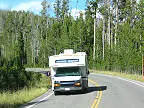 |
Towable RV  |
Class A Motorhome 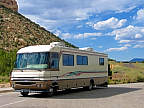 |
- Class B units are also called camping vans and are built on a van or truck chassis.
- Class A motor homes can be gas or diesel powered, are mostly custom built, and can be quite basic or extremely elaborate.
.... to what to do with your house before, during and after the trip, how to leave family behind for a year, what you saw in various states, your actual budget, and much more--over 250 pages. It's hard to imagine that you left out anything? Anything else you wish you'd included.
Carol: (laughing) As you pointed out – we really tried to cover everything that you might need to know or consider to do a long RV trip like this. We included a budget “model” to help you figure out your own budget and showed you a couple of different levels of expenditures. We gave detailed packing lists, showed a sample itinerary, talked about choosing your vehicle, what to do with “life” back home and more.
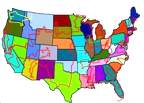
Some people have suggested that we tell more about where we went and where we stayed. We purposely didn’t do that because we think that your RV trip shouldn’t be our RV trip – we all have different interests in our lives and having the tools to do the planning of “living your dreams” is part of the joy of doing an RV trip like this.
The Economy
BG: With the economy now more uncertain and the unexpected retirement fund losses experienced by many, do you still think that a road trip can be made affordable.
Carol: Yes, I think that a road trip can be accomplished on any budget. Just like the rest of life, some people live on $10K a year and some live on $100K per year – they both live, but their lifestyles are different – the same is true of road trips – whatever you are spending today, if you follow our advice as given in our book, you can live on the road for a year on that same budget.
BG:How many RV's are on the road now. Do you know how many people a year actually take this dream trip around the country. Is this increasing and making parks more crowded. Did you find it hard to find campground spaces.
Carol: Actually, RVIA.org (the Recreation Vehicle Industry Assn.) estimates about 8.2 million RVs on the road – one in every 12 vehicle-owning households in the United States owns an RV. They don’t keep stats on how many may want to take a long trip, but our book was conceived because of the many, many people we met on the road who said, “Oh, we’d love to do what you are doing, but what did you do about…” and the list of “need to knows” would begin.
We decided that there must be thousands of people wanting to do a long trip just based on the people we met. With 78 million baby boomers beginning to retire and listing “travel’ as their top priority in retirement, we decided that a book on the topic would be a winner and that an increasing number of people would be interested. This has proved to be true. We have helped so many people to “live their RV road trip dream.”
Gas Prices
BG:I noticed recently the gas prices creeping up again, how will that affect the road trip dream.
Carol:Gas prices certainly affect RVing, but what RVIA found was that people didn’t abandon RVing when gas prices were high, they just went shorter distances and stayed longer in one place.
Most people think that gas prices are the #1 expense for travelers, but we found that they are only #4 or 5 – behind food costs, lodging/campgrounds, vehicle costs/maintenance/insurance, and maybe even cost of your adventures – which is highly dependent upon what you enjoy doing and what you decide is important for you on your road trip dream.
BG:You chose to stay in motels 4 times a week. Was this because of the type of RV you had. Was this a cost decision or a lifestyle decision.
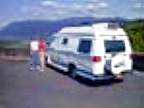
Carol: We found that even in peak times, you could always find a campground to stay in. We were lucky because our vehicle was small and they could tuck us in most anywhere – we had some really cool RV campsites because of that.
We didn’t stay in our rig all the time partly because we wanted to sample other types of interesting lodging (historic hotels, cabins, etc.), also due to convenience to places we wanted to see and partly because of the size of our unit. Phil tended to get a bit claustrophobic. Many people are perfectly comfortable in their Class B’s, but we are pretty big people, and we weren’t proficient RVers!
Cooking in an RV
BG: By staying in a smaller RV type, a Class B van, did you feel you had to eat meals out more often. Do you still feel you chose the right RV for you.

Carol:Cooking in the van was a breeze – even when we weren’t camping in it, we nearly always had breakfast, and often lunch from the refrigerator. When we camped, I tried to cook extra to have for leftovers the next night or lunches for a couple days.
We did feel it was the right RV for us because our plan was not to use it as a full-time camping unit – we saw it more as an over sized car than an undersized RV!! It definitely served the purpose that we bought it for – ease of driving, ability to take it anywhere, good on gas mileage, ease of maintenance (any Dodge dealer could service it), lots of storage, full bathroom, full kitchen for cooking along the way – oh, and you could sleep in it too when we wanted to.
BG: What is it like to cook in an RV. What kinds of meals did you have. Was it difficult to cook dinner in an RV every night. How did you shop for food.
Carol:I got really good at simple one-dish meals. Here’s the basics: Pick a meat (beef, pork, chicken, fish) brown it quickly in a pan. Add some type of starch – potatoes, pasta, rice – and a frozen or fresh veggie or two. Add the uncooked starch and the veggies to the pan with the meat on top and with the appropriate amount of liquid and spices to your taste – pour yourself a drink and wait for it all to be done! If you're a vegetarian, leave out the meat. You'll find roadside stands of fruits and veggies.
We also did simple things like BBQ chicken/beef/pork/fish, with baked potatoes and a salad. We didn’t find cooking in the RV to be a problem at all. I had a two-burner stove, a microwave oven and a small refrigerator – it was fun figuring out how to make good meals in limited space and with limited facilities.
What WAS different, was how I shopped – no Costco, no stocking up, -- lots more pre-packaged things than I normally use – i.e. packaged scalloped potatoes, rice pilaf mixes, pre-made baked goods, frozen entrees or side dishes, pre-cooked bacon, etc. We shopped about once a week.
RV Trip Activities
BG: What did you do to relax in the RV--activities while not driving.
Carol: We kept a website the entire length of our trip, my trip journal, so I would spend time every few nights working on that for our family and friends.
We had TV/cable, so often we could watch actual TV and always watch movies, we played cards, took evening walks, participated in campground activities, did laundry, and read. Remember, we were moving along and sightseeing almost every day, so we didn’t have long stretches in campgrounds – or motels.
Communities
BG: What types of RV communities did you come across.
Carol: We tended to stay in KOAs, Good Sam Club parks, and other private campgrounds.
A few of the RV parks we stayed in were a mix of short- and long-term folks (segregated by type!), but mostly the tourist-oriented ones were a better location and fit for us.
Snowbirds
BG: Many of our readers are snowbirds. Would an RV be a good way to be a snowbird for six months a year. Would this require a larger RV with more room than you had in a van-type RV.
Carol: Yes, we have many friends that snowbird in their RVs. Some rent spaces down south each year (they have the ability to change location each season) and some own a space in a resort-type community and go to the same location each year. Each has its own advantages. If you were going to live in your RV (rather than just RV travel in it), then, yes, you would want a larger unit than the van-type like we had.
BG:Did you find anyone who made RV travel a permanent way of life. If so, do you have any thoughts on whether this would be an inexpensive way to retire.
Carol: RVing is a fun and enjoyable lifestyle and we know many people who enjoy it without a "base camp." Thousands of people each year choose to live permanently in their RV – or at least for some period of years while they can still be active and enjoy that vagabond lifestyle.
RV Prices
Carol: RVing can be inexpensive or very deluxe, depending upon what you want. With some coaches now costing upwards of a million dollars and some places to park them in high-end resorts costing a half million or more – RVing is no longer reserved for the frugal lifestyle. There is an RV and a lifestyle to fit every budget.
BG: And right now I've heard the costs of RV's, like automobiles, has been greatly reduced due to the economy so it may be a good time to go to the shows and dealers and take a look. You explain this and how to shop for an rv very well in your book.
I was impressed with Carol's insights. She honestly admits that the RV road trip is not for everyone. Your information helps people know what life on the open road is all about and then they can decide if it is for them.
Here are some favorite quotes of mine from the book (these are just a few since there are too many to mention:
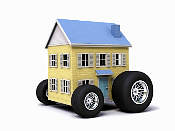
"You just have to think of it like a house."
"Make exercise a part of your routine."
"Nothing seems to strike fear into the hearts of couples faster than the idea of being together on a 24/7 basisfor even a week, much less a year."
Exploring Retirement Lifestyles
Carol is that friend with all the answers that everyone wants to have if you are thinking of an RV road trip.
Here is that gem of a book about RV trips to take along. And, as I've stated before, by exploring different retirement lifestyles, you are better able to make good decisions about where and how to spend your retirement.
Quite a bit in the book is about the places they visited, which is also helpful when deciding where to retire. An RV Trip may help in this regard also. Carol visited most of our retirement states and tells about the places she visited.

Learn more about RV's, RV park models and parks in Arizona in this article by an RV authority and owner of RV parks.